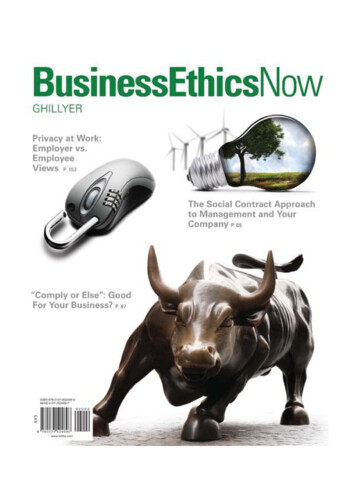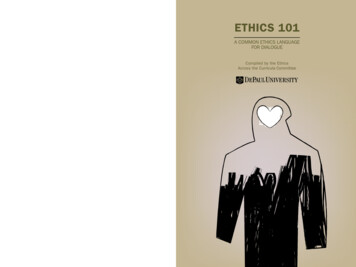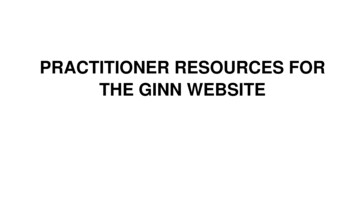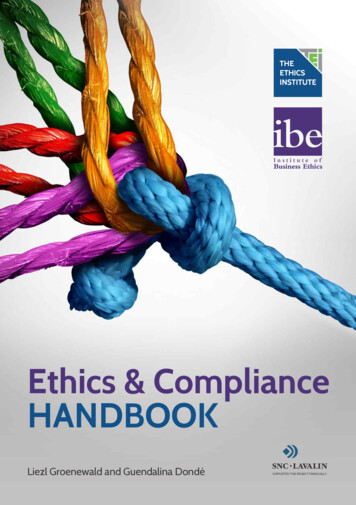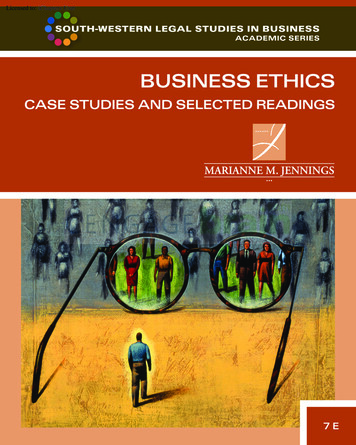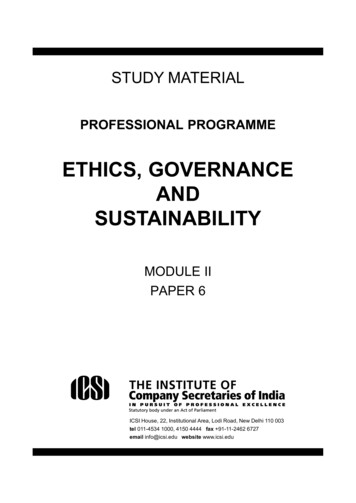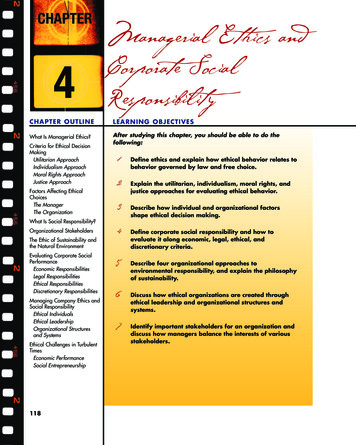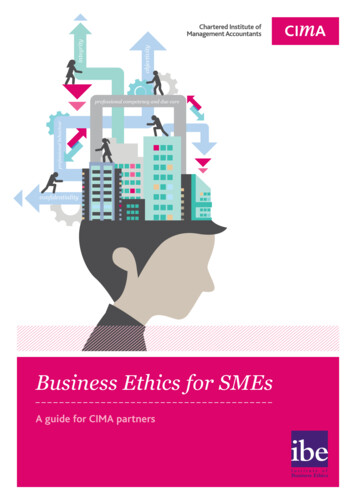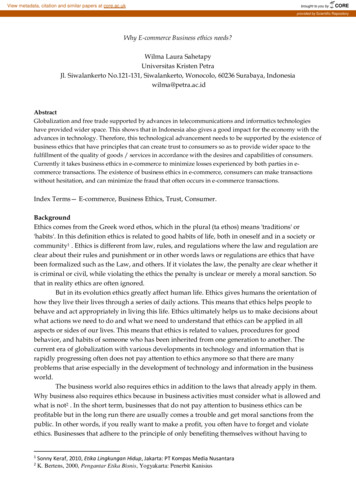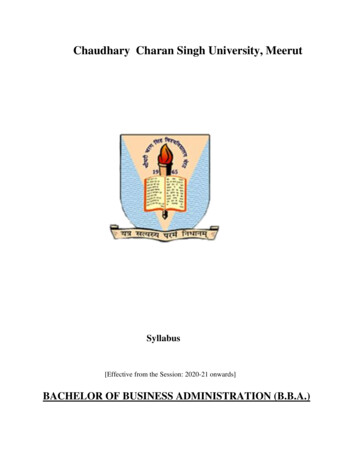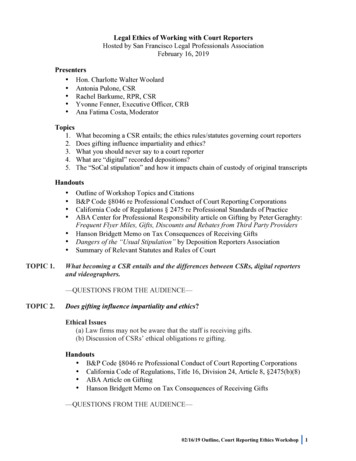
Transcription
Legal Ethics of Working with Court ReportersHosted by San Francisco Legal Professionals AssociationFebruary 16, 2019Presenters Hon. Charlotte Walter Woolard Antonia Pulone, CSR Rachel Barkume, RPR, CSR Yvonne Fenner, Executive Officer, CRB Ana Fatima Costa, ModeratorTopics1. What becoming a CSR entails; the ethics rules/statutes governing court reporters2. Does gifting influence impartiality and ethics?3. What you should never say to a court reporter4. What are “digital” recorded depositions?5. The “SoCal stipulation” and how it impacts chain of custody of original transcriptsHandouts Outline of Workshop Topics and Citations B&P Code §8046 re Professional Conduct of Court Reporting Corporations California Code of Regulations § 2475 re Professional Standards of Practice ABA Center for Professional Responsibility article on Gifting by Peter Geraghty:Frequent Flyer Miles, Gifts, Discounts and Rebates from Third Party Providers Hanson Bridgett Memo on Tax Consequences of Receiving Gifts Dangers of the “Usual Stipulation” by Deposition Reporters Association Summary of Relevant Statutes and Rules of CourtTOPIC 1.What becoming a CSR entails and the differences between CSRs, digital reportersand videographers.—QUESTIONS FROM THE AUDIENCE—TOPIC 2.Does gifting influence impartiality and ethics?Ethical Issues(a) Law firms may not be aware that the staff is receiving gifts.(b) Discussion of CSRs’ ethical obligations re gifting.Handouts B&P Code §8046 re Professional Conduct of Court Reporting Corporations California Code of Regulations, Title 16, Division 24, Article 8, §2475(b)(8) ABA Article on Gifting Hanson Bridgett Memo on Tax Consequences of Receiving Gifts—QUESTIONS FROM THE AUDIENCE—02/16/19 Outline, Court Reporting Ethics Workshop1
TOPIC 3.What You Should Never Say to A Court ReporterEthical Issues(a) Outside the earshot of other counsel, attorneys ask court reporters for their opinionabout their performance, the witness’ veracity, or opposing counsel.(b) An attorney either at a deposition or in court (or sometime thereafter on the phone)asks a reporter for (1) a rough draft, (2) an expedite of the transcript or (3) an excerpt– and tells the CSR not to inform opposing counsel.Handouts California Code of Regulations, Title 16, Division 24, Article 8, §2475(b)(6) California Code of Regulations, Title 16, Division 24, Article 8, §2475(b)(5)—QUESTIONS FROM THE AUDIENCE—TOPIC 4.What Are Digital Recorded Depositions?Ethical Issues: Is the witness sworn? Confidentiality & accuracy of deposition testimony Chain of custody of exhibits and original transcripts Are attorneys and staff informed in advance non-CSRs are present?Handout Summary of Relevant Statutes & Rules of Court—QUESTIONS FROM THE AUDIENCE—TOPIC 5.How the "SoCal stipulation" impacts chain of custody of original transcriptsEthical Issues: Chain of custody issues; integrity of the record; law firm staff upset when theyreceive unsealed originals Errata not distributed to all parties (discovered at trial during Q&A of witness) Original transcripts clearly torn apart and rebound presented to judge at trial. Reporters are in a bind, required to keep integrity of originalHandouts California Code of Civil Procedure 2025.520 Dangers of the “Usual Stipulation” by Deposition Reporters Association—QUESTIONS FROM THE AUDIENCE—Conclusion02/16/19 Outline, Court Reporting Ethics Workshop2
FindLawCodesCaliforniaBusiness and Professions CodeBPC § 8046California Business and Professions Code Section 8046Search California Codes Search by Keyword or CitationSearch0 2« PrevNext »A shorthand reporting corporation shall not do or fail to do any act the doing of which or thefailure to do which would constitute unprofessional conduct under any statute, rule or regulationnow or hereafter in effect which pertains to shorthand reporters or shorthand reporting. Inconducting its practice it shall observe and be bound by such statutes, rules and regulations to thesame extent as a person holding a license under this chapter.« PrevNext »- See more at: ns-code/bpc-sect8046.html#sthash.U25KABTO.dpuf
Your ABA: March 2010 Frequent flyer miles, gifts, discounts and rebates from third party providersSend a letter to the editorPrint this pageDo you have a question about legal ethics that affects your practice? ETHICSearch canEmail this articleEye on Ethicshelp. For quick and confidential research assistance, click here to send your questions.Frequent flyer miles, gifts, discounts andrebates from third party providersBy Peter GeraghtyDirector, ETHICSearchABA Center for Professional ResponsibilityYou have a solo practice that concentrates in family law. A court reportingfirm has offered you discount points that can be redeemed at the end ofthe year for cash refunds and other benefits. Can you keep the benefits?You also use a credit card for your practice that generates frequent flyermiles for every purchase you make. Do you have an obligation to informyour clients that you are receiving miles when you make purchases ontheir behalf? Must these miles be allocated to your clients?ABA Formal Opinion 93-379 Billing for Professional Fees, Disbursements andOther Expenses made the following statement about what a lawyer should do whenoffered a discount from third party providers: In the absence of disclosure to the contrary.if a lawyer receives a discounted ratefrom a third party provider, it would be improper if she did not pass along the benefit ofthe discount to her client rather than charge the client the full rate and reserve the profitto herself. Clients quite properly could view these practices as an attempt to createadditional undisclosed profit centers when the client had been told he would be billed fordisbursements.The opinion based its reasoning on Model Rules 1.5 Fees and 1.4 Communication. Itcited to subpart (b) of Rule 1.5 as it existed prior to the ABA Ethics 2000 Commission’schanges to the rule in 2003 which stated as follows:.When the lawyer has not regularly represented the client, the basis or rate of the feeshall be communicated to the client, preferably in writing, before or within a reasonabletime after commencing the /201003/article11.html (1 of 5) [1/5/2011 9:19:05 AM]Frequent flyer miles, gifts,discounts and rebates fromthird party providersTechnology TranslatorsQuick Access ToolbarFirst FocusTech gurus on today’s legaltechnologyAround the ABASocial networking and theworkplaceImproving relations withstaffNetworking best practicesWriting tips fromcopywritersSeeking supplementalincomeDiversity on a shoestringConducting internalinvestigationsTech tips for tightwads
Your ABA: March 2010 Frequent flyer miles, gifts, discounts and rebates from third party providersThe opinion also cited to paragraph 1 of the Comment to Rule 1.5 that stated:In a new client-lawyer relationship . an understanding as to the fee should be promptlyestablished. It is not necessary to recite all the factors that underlie the basis of the fee,but only those that are directly involved in its computation. It is sufficient, for example, tostate that the basic rate is an hourly charge or a fixed amount or an estimated amount,or to identify the factors that may be taken into account in finally fixing the fee. Whendevelopments occur during the representation that render an earlier estimatesubstantially inaccurate, a revised estimate should be provided to the client. A writtenstatement concerning the fee reduces the possibility of misunderstanding. Furnishingthe client with a simple memorandum or a copy of the lawyer's customary fee scheduleis sufficient if the basis or rate of the fee is set forth.Note that both the black letter Rule 1.5 and comment were subsequently amendedpursuant to the ABA Ethics 2000 Commission’s recommendations in 2003, although thesubstance of the two above excerpts from the rule are substantially the same in the currentversion of the rule. The E2K did, however, add paragraph 1 to the comment that in partincorporates some of the reasoning of Formal Opinion 93-379. This paragraph states:Back to top Reasonableness of Fee and Expenses[1] Paragraph (a) requires that lawyers charge fees that are reasonable under thecircumstances. The factors specified in (1) through (8) are not exclusive. Nor will eachfactor be relevant in each instance. Paragraph (a) also requires that expenses for whichthe client will be charged must be reasonable. A lawyer may seek reimbursement for thecost of services performed in-house, such as copying, or for other expenses incurred inhouse, such as telephone charges, either by charging a reasonable amount to which theclient has agreed in advance or by charging an amount that reasonably reflects the costincurred by the lawyer.Alaska State Bar Ethics Opinion 95-4 took issue with ABA Formal Opinion 93-379’s positionthat a lawyer could keep the benefits of a discount so long as the lawyer obtained clientconsent after full disclosure:A lawyer who obtains a discounted airline ticket or hotel room should not charge theclient the cost for the undiscounted fare or room. The benefits of any discount must bepassed on to the client. [FN2] FN2. ABA Formal Opinion 93-379 seems to imply that surcharges can be added on todiscounted third party services so long as they are disclosed. Opinion 93- 379 at 9. TheCommittee declines to adopt such a standard for Alaska. Given the lawyer's 03/article11.html (2 of 5) [1/5/2011 9:19:05 AM]MembershipABA resource continues tohelp members survive hardtimesMember AdvantageBrooks Brothers’ Aprilsales event
Your ABA: March 2010 Frequent flyer miles, gifts, discounts and rebates from third party providersobligation to treat clients fairly and reasonably, we can see no justification for notpassing the benefits of discounts on to clients. –Alaska Bar Opinion 95-4 (1995).Other state and local bar opinions have concluded that a client should be the beneficiary ofrebates, discounts or gifts given to her lawyer in exchange for engaging the services of athird party on the client’s behalf unless the client consents to the lawyer keeping the rebateor discount after full disclosure. See, Alabama (Birmingham Bar Association) Opinion 8983 (1989):A lawyer who receives an "award check"from the court reporter as a result of orderingdeposition transcripts that were paid for by a client may only accept the "check,"whichmay be used to order merchandise through the court reporter from an exclusivemerchandise catalog, after obtaining consent of the client after full disclosure. A lawyermay not accept anything of value absent the knowledge and consent of his client afterfull disclosure. - 901 Law. Man. Prof. Conduct 1058 (1989).The Alabama opinion cited to DR 1-102(A)(4) of the Alabama Code of ProfessionalResponsibility (The Model Rule corollary is subpart (c) of Rule 8.4 Misconduct) thatprohibits a lawyer from engaging in conduct involving fraud, deceit and dishonesty for theproposition that a lawyer must be “ scrupulous in dealing honestly and forthrightly withmembers of the public—and particularly with his own clients.” See Also District ofColumbia Opinion 185 (1987) and Iowa Opinion 00-2 (2000), a digest of which states:A lawyer may sell "probate and other similar bonds"to clients, but the commissions,rebates, discounts, etc., belong to the client and must be disclosed and credited to theclient unless the client consents to their distribution to the lawyer - 1101 Law. Man.Prof. Conduct 3601.Back to topFrequent flyer milesHow a lawyer should deal with frequent flyer miles present issues that are morecomplicated than discounts and rebates. Two ethics opinions, from the Massachusetts andBoston bars, have dealt specifically with frequent flyer miles. Both opinions addressed thesame hypothetical and came to slightly different conclusions.Boston Bar Association Opinion 93-4 (1993) stated that in most situations, a lawyer neednot disclose that he receives frequent flyer miles to his clients provided that he did notpurchase a ticket that was more expensive solely to obtain miles. The opinion also notedthat the fact that credit card purchases often result in miles that accrue to the credit cardholder is generally known to the public and that therefore no disclosure is necessary. Theopinion also noted that it would be difficult to properly credit each client for the miles, ticle11.html (3 of 5) [1/5/2011 9:19:05 AM]
Your ABA: March 2010 Frequent flyer miles, gifts, discounts and rebates from third party providersthe lawyer would accumulate the miles over a long period of time and for many differentclients, the miles are typically not transferable to anyone other than family members andthe amount of miles to be gained for any one transaction is generally nominal in value. Theopinion did indicate, however, that if the lawyer were to use his frequent flyer miles topurchase a ticket to travel on behalf of a particular client, he should disclose it to the clientso that the client can decide if she wants to reimburse the lawyer for the use of his miles.The opinion also noted that in the event that the lawyer does a great deal of travel on behalfof a particular client, the lawyer should “either use the credit for the benefit of the client, ifpractical, or discuss the matter with the client.”Massachusetts Bar Opinion 94-1 stated that the lawyer must disclose the fact that hereceives the credits if it is more that a “de minimis” value. The opinion suggested that inthe event that the lawyer makes significant purchases or travels frequently on behalf of aclient that would result in a significant amount of miles, the lawyer should disclose this tothe client and give the client the option of purchasing the tickets himself. The opinionstated:The variety of different situations which might give rise to an economic benefit for thelawyer make it impossible to formulate a hard and fast rule as to when the benefit mustbe disclosed to the client. Consistent with the provisions of DR 2-106(B) and DR 5-107(A)(2), the committee's view is that, assuming that there is no additional cost to theclient in procuring the service which carries with it a benefit, the requirement ofdisclosure to the client depends on two factors. First, is the benefit of more than deminimisvalue and one which could be claimed by the client? If so, the client should beadvised of the availability of the benefit. For example, in those cases where the air travelin a given case is more than de minimisand a client could obtain frequent flyer milesby paying for the travel directly, the lawyer should discuss with the client whether hewishes to pay directly and thereby obtain the benefit for himself. Similarly, where travelfor an individual client is of such magnitude that sufficient frequent flyer miles areaccumulated to purchase tickets which could be used for additional travel on that client'sbehalf, the issue should be discussed with the client. Second, is the benefit, while notavailable to the client, of such significant value as to have a potential to influence theattorney's selection of the service provider? In that case, the existence of the benefitshould be disclosed to the client. Disclosure will ensure that the client is able to informhimself as to the reasonableness of the expense. It will also avoid any appearance thatthe attorney's selection of the service provider was not based solely on the needs of theclient, but was influenced by the availability of the benefit.The opinion also stated that the lawyer must disclose the fact that he is receiving miles ifthe lawyer begins to make purchasing decisions based upon the credit or benefit he maypotentially receive from the third party 3/article11.html (4 of 5) [1/5/2011 9:19:05 AM]
Your ABA: March 2010 Frequent flyer miles, gifts, discounts and rebates from third party providersOn a related topic, See "Can a Lawyer Accept Referral Fees or Commissions from NonLawyers?" which appeared in the June 2007 issue of YourABA.Questions involving rebates, discounts and other benefits from third party providers canpresent thorny ethical issues. As always, check your state or local bar association ethicsopinions and rules of professional conduct. Your local bar association may be also be ableto help.Back to topBack to homeYourABA is a monthly publication e-mailed to all ABA members who haveprovided an e-mail address.If you are already a member and want to sign up for YourABA, click here.If you would like information on joining the ABA, click here.Your e-mail address will only be used within the ABA and its entities.We do not sell or rent e-mail addresses to anyone outside the ABA.Update your profile Unsubscribe Privacy PolicyAmerican Bar Association 321 N Clark Chicago, IL 60654-75981-800-285-2221 2010 American Bar 003/article11.html (5 of 5) [1/5/2011 9:19:05 AM]
MemorandumTO:Deposition Reporters Association of CaliforniaCalifornia Court Reporters AssociationFROM:Wendy L. TauriainenDATE:February 11, 2011RE:Taxation of incentives given by court and deposition reporting firmsI.Issue Presented.Deposition and court reporting firms (“Reporting Firms”) often provide incentives to legalassistants, attorneys, and others in exchange for booking the Reporting Firm‟s services. Theseincentives can have significant value, such as bottles of champagne, video game systems,department store gift cards, and points to be earned toward vacations. This memo will analyzethe tax consequences to both Reporting Firms and recipients of such incentives.II.Tax Consequences to Recipients.The IRS has recently become more attuned to the issue of treating so-called “gifts” as income.In 2006, the IRS reached a settlement with the Academy of Motion Picture Arts and Sciencesinvolving the value of gift bags distributed to presenters and performers of its Academy Awardshows.1 The IRS stated that the recipients of these gift bags generally must report the fairmarket value of the bag and its contents as income.2 While the gift bags are called "gifts," theyare not gifts for income tax purposes because they are not given "solely out of affection,respect, or similar impulses for the recipients of the gift bags."3 Instead, they were provided inexchange for the artist performing or presenting at the Awards show.4 The settlement betweenthe IRS and the Academy involved the Academy's promise that it would distribute taxinformation to recipients of the gift bags notifying them of their responsibility to satisfy their taxobligations.5 The IRS news release regarding the settlement stated that the IRS would continueto focus on compliance by recipients to ensure that the fair market value of the gifts is reportedas income.6 The IRS also stated it would continue to monitor compliance by the providers of giftbags to ensure that Form 1099s are issued to recipients.7 The Academy has since discontinued1IRS News Release IR-2006-128.IRS "Gift Bag Questions and e/0,,id /academyawards.pdf.5IRS News Release IR-2006-128.6Id.7Id.2Hanson Bridgett LLP500 Capitol Mall, Suite 1500, Sacramento, CA 958142807325.5
Memorandum To:Deposition Reporters Association of CaliforniaCalifornia Court Reporters AssociationFebruary 11, 2011Page 2the practice.8 The Reporting Firm incentives are very similar to the awards shows gift bags -they are things of value in exchange for a benefit conferred -- and should be treated similarly toensure compliance with tax rules.A.Gift or Payment for Services?The tax consequences to the recipient depends on whether the incentive is a gift orpayment for a service. True gifts are not included in the gross income of the recipient.9Whether or not a transfer is a gift is determined by examining the intent of the transferor.10 Theabsence of a legal or moral obligation to make the transfer does not make the transfer a gift. 11An incentive will be treated as a taxable payment for services unless the motive for the transferis “detached and disinterested generosity” made out of “affection, respect, admiration, charity orlike impulses.”12 This is true even if the transferor receives no economic benefit from thetransfer.13Incentives given by Reporting Firms in exchange for bookings will not be treated as giftsfor tax purposes because there is a clear relationship between the incentive and theperformance of a service by the recipient. The quid pro quo nature of the transaction removesany possibility that the incentive is given out of disinterested generosity. Further, even if theincentive were characterized as a prize or award, the IRC specifically includes amountsreceived as prizes and awards in gross income unless the prize or award is transferred directlyto a charity.14Given that the incentives provided by Reporting Firms in exchange for business arepayments for services rather than gifts, the IRC requires the recipients of those payments totreat the value of the incentives as gross income.15 This means that recipients must report thevalue of the incentives they receive as income on their tax returns. Failure to do so could resultin the assessment of additional taxes, interest and penalties by the Internal Revenue Service.B.Can the Income Be Excluded by the Individual Recipient?8Academy of Motion Picture Arts and Sciences "Academy and IRS Reach Gift Basket Accord" s.pdf.9IRC Section 102.10See Commissioner v. Duberstein, 363 U.S. 278 (1960) (“Gift” to taxpayer of automobile in recognitionof business referrals made to business friend was payment for services despite taxpayer‟s reluctance toaccept gift).11See Old Colony Trust Co. v. Commissioner, 279 U.S. 716, 730 (1929) (Payment by employer ofemployee‟s income taxes was not a gift despite lack of obligation on employer‟s part for such payment).12See Commissioner v. LoBue, 351 U.S. 243, 246 (1956) (Transfer of stock options to employee notmade “with the kind of detached and disinterested generosity which might evidence a „gift‟ in the statutorysense.”); Robertson v. United States, 343 U.S. 711, 714 (1952) (Taxpayer‟s receipt of prize money for awinning symphonic composition constituted taxable income rather than a gift).13See Robertson, 343 U.S. at 714.14IRC Section 74; Treas. Regs. Section 1.74-1(a)(1).15IRC Section 61(a). (Stating gross income means income from whatever source derived, includingcompensation for services, including fees, commissions, fringe benefits, and similar items.)2807325.5
Memorandum To:Deposition Reporters Association of CaliforniaCalifornia Court Reporters AssociationFebruary 11, 2011Page 31.Incentive Given by Reporting Firm to Individual.Where the incentive is given directly by the Reporting Firm to an individualattorney or law firm employee, it is unlikely that an individual attorney or law firm employeecould exclude the value of the incentives from income. Given the "payment for services" natureof the incentives, the fair market value of the incentives must be reported by these recipients astaxable income.2.Incentive Given by Reporting Firm to Law Firm.Similarly, an incentive given by the Reporting Firm to a law firm, which thentransfers the incentive to its employee, may also be includible in the employee's taxable income.Gifts by an employer to an employee may not be excluded from being considered income of theemployee.16 However, the IRC does permit the exclusion from income of certain fringebenefits.17 Thus, whether the law firm must impute income to the employee for the value of anyincentives the law firm receives from a Reporting Firm and then passes on to an employeedepends on whether the incentive falls under any of the exceptions in the fringe benefit rules.The only fringe benefit exception which could apply to incentives is the “deminimis fringe.” A de minimis fringe benefit is one which is so small as to make accounting for itunreasonable or administratively impracticable.18 While de minimis fringe benefits can bededucted as business expenses, they will not be included in the recipient‟s gross income.19 TheTreasury Regulations give examples of benefits which do and do not qualify as de minimis. Forexample, occasional typing of personal letters by a company secretary, occasional cocktailparties, traditional birthday or holiday gifts of property with a low fair market value (but not cash),and flowers provided on account of illness are all de minimis fringe benefits and may beexcluded from gross income.20 By contrast, season tickets to sporting or theater events,membership dues to a country club or gym, or even use of an employer-provided vehicle morethan once a month are not de minimis fringe benefits and must be included in income.21Further, no cash or cash equivalent (such as a gift certificate or gift card) will qualify as a deminimis fringe benefit.22The value of the incentive provided to the law firm by the Reporting firm, andthen passed onto the employee, may or may not be excludible from the employee‟s incomeunder the de minimis fringe benefit exception depending on the nature and value of theincentive. A department store gift card will never be excludible because it is a cash equivalent.Items like theater tickets or group meals may be excludible assuming they are given soinfrequently both to the employees as a whole and to individual employees as to make16IRC Section 102(c).IRC Section 132(a).18IRC Section 132(e).19See, e.g., IRS Field Service Advice 200219005 (December 31, 2001).20Treas. Reg. Section 1.132-6(e)(1).21Treas. Reg. Section 1.132-6(e)(2).22Treas. Reg. Section 1.132-6(c).172807325.5
Memorandum To:Deposition Reporters Association of CaliforniaCalifornia Court Reporters AssociationFebruary 11, 2011Page 4accounting for them unreasonable or impracticable.23 Of course, determining how frequently orinfrequently these items are distributed, and to whom, requires some degree of administrativetracking, which necessarily hinders an argument that such tracking is unreasonable orimpracticable.If the law firm determines that the fringe benefit is not excludible as a de minimisfringe, it must include the fair market value of the benefit in the employee‟s wages and withholdthe appropriate employment taxes. Failure to do so could subject the law firm to additionaltaxes, penalties and interest. Further, the employer could be required to issue amended W-2sto affected employees who would then be required to file amended tax returns and possibly payadditional tax, interest and penalties.3.Similarity of Some Kind of Incentives to Tips.Alternatively, a law firm may be required to withhold and pay employment taxesbased on the kind of the incentive received by the employee because of the similarity ofincentives to tips. Similar to tips, incentives are paid by Reporting firms to a law firm'semployees and are payments made in the course of the employee's employment. Employeesare required to report to their employer cash tips received in amounts over 20 in one month.24Employers are then obligated to withhold employment taxes from those amounts. "Cash" tipsfor these purposes includes "monetary media of exchange."25 Tips paid in the forms of passes,tickets and other goods or commodities are not included in the employee's wages.26 Thus,where incentives are paid in the form of things like pre-paid charge cards, or other cashequivalents, an analogy can be drawn to the reporting and withholding requirements whichapply to tips, leaving the employee potentially obligated to report the value of the cashequivalent incentives to the employer and the employer potentially obligated to withholdemployment taxes on those amounts.4.Tax Liability of Law Firm for Incentives Paid To Their Employees ActingWithin the Scope Of Their Employment.When an incentive is provided to, say, a paralegal or a secretary for booking adeposition at the instruction of a member or another employee of the firm, the question arises:who is the recipient of the incentive, the law firm or the employee? No authority foundconclusively determines the answer. Law firms therefore cannot with precision predict how theInternal Revenue Service will treat the matter and, in fact, the issue may turn on the specificfacts of each case. As discussed in the Conclusion, law firms may want seriously to weigh thepros and cons of permitting their employees to receive such incentive gifts, for this and all of theother reasons just discussed.23Treas. Reg. Section 1.132-6(b).IRC Section 6053(a).25Treas. Reg. § 31.3121(a)(12)-1.26Id.242807325.5
Memorandum To:Deposition Reporters Association of CaliforniaCalifornia Court Reporters AssociationFebruary 11, 2011Page 5III.Tax Consequences to Reporting Firms.A.Treatment of Incentives as “Kickbacks.”IRC Section 162(c)(2) disallows business expense deductions for payment of illegal“kickbacks.” Kickbacks are defined as payments that could subject the payor to criminal penaltyor the loss of license or privilege to engage in a trade or business.27 Under the California Codeof Regulations, the Court Reporters Board of California may suspend, revoke or denycertification of a shorthand reporter for directly or indirectly giving any gift, incentive, reward oranything with a value exceeding 100 in aggregate during a calendar year to any person orentity associated with a proceeding being reported.28 This rule also applies to Reporting Firmswhich are corporations and thus under the jurisdiction of the Court Reporters Board ofCalifornia.29 While Reporting Firms that qualify as “professional corporations” under CaliforniaCorporations Code section 13401(b) them
02/16/19 Outline, Court Reporting Ethics Workshop 1 Legal Ethics of Working with Court Reporters Hosted by San Francisco Legal Professionals Association February 16, 2019 Presenters Hon. Charlotte Walter Woolard Antonia Pulone, CSR Rachel Barkume, RPR, CSR Yvonne Fenner, Executive Officer, CRB Ana Fatima Costa, Moderator Topics
